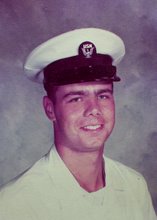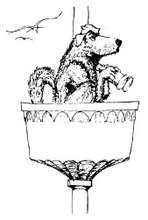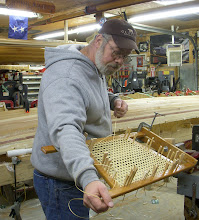
Bob:
A good friend of mine, Bob, is not doing too well these days. I guess when you’re ninety-one, age has a way of slowing you down.
As a young soldier, Bob wore the 79th Division’s "Cross of Lorraine" on his shoulder. As a sergeant in a mortar platoon, Bob’s first vision of Europe was at Utah beach, from a Higgins landing craft, D-Day+6. Bob told me,"The first day we were there, we had two men die during our thirty mile run off of the beach."
The invasion of Normandy, so many years ago, had the members of the 314th Infantry Regiment, 79th Infantry Division fight their way from Utah Beach, through Cherbourg, into La-Haye-du-Puits, across France, through the For Lt de Parroy, into Belgium, the Netherlands and Germany and then conduct operations as part of the Army of Occupation in Czechoslovakia. The 314th was the first U.S. Army unit to cross the Seine River and the first into Belgium.
Sometime during Bob’s travel through Czechoslovakia, the troops stopped to rest in a section of a small town that was pretty much blown to bits. These troops were dog tired. Bob told me that they did manage to find shelter from the rain in an old abandoned hotel ballroom. The men were quite happy about being able to dry out and being allowed to start a fire. Before long, one of the soldiers found a piano and started playing a melody on it. Then a trombone popped up, and another dogface was found that could blow a tune with it. Then a while later somebody located a violin started plucking it's strings. Bob played a "fiddle" as a kid, and he came a running when he heard that familiar plucking noise. Well before long they had a little band playing some half way decent music! They had a grand time of it. Bob said,"We sure made the best of it, with what little time we had to rest. Now the boys were dancing and laughing it up. Bob said,"That’s something I hadn’t seen since we were in England!" When the company got ready to move out, the CO told Bob to stuff the "fiddle case" into the relative safety of his Command Jeep's windshield cover. The "fiddle"was played whenever time allowed.
When Bob got ready to muster out of the Army, he asked his CO what he should do with the "fiddle." It wasn’t his, and he wanted to give it back to the owner. Bob was told that there was no way he or the Army were ever going to find the owner in this mess they were in. "Take it home and play it for the children your going to have." So he did.
In 1977, Bob, his wife Nona, and his son Phillip, went to Europe for Bob’s retirement vacation. They saw their new Volvo station wagon built in Sweden, and then drove it throughout Europe, visiting most of the places Bob had to walk through before, some thirty years prior. Bob told me it only took him three months to see the sights in a Volvo.
He never did find the "fiddle " owner, although he’d tried several times. I got to hold that fragile old looking "fiddle" he so dearly cherishes. I looked it over very carefully and I noticed a piece of paper glued inside of the body of the instrument. As I held it beneath a light, I saw the word "Stradivarius" and it had a date saying the instrument was over 200 years old. Bob smiled when he saw the look on my face. "It’s just a copy." he said.
314th/79th Tentative Casualty Statistics 'Killed in Action: 2,476'
'Wounded in Action: 10,971'
'Later Died of Wounds: 467' 'Captured or Missing in Action: 1,699'
'Disease and Non-Battle Injuries: 14,875'
'Prisoners of War Taken: 35,466'
Bob’s Passing
Bob passed yesterday afternoon, May 15, 2006. He'd finished mowing his lawn, returned to the hospital to visit his wife Nona, and collapsed in mid-sentence while speaking with her. He was ninety-one years young. So long Bob. You were one of the finest men I've ever had the pleasure to meet.
Bob’s funeral:
Bob passed on the 15th of May 2007. His funeral and remembrance celebration was held on the 20th of May. I was honored to be one of Bob’s pall bearers.
These are some of the new things I’d learned of Bob:
Bob Thistlethwait, was the oldest man in his company when he went through Army basic. He took pride in running on the heels of his Drill Instructor whenever he had the chance. After basic, Bob was assigned to the 79th, when the “Cross of Lorraine Infantry Division” was reactivated at he beginning of WWII.
Bob was wounded badly three times during the war, twice he was sent back to England to recuperate. He always went back to his mortar company when he healed up. During one heated battle, Bob and a buddy dove into a shell crater for cover from a mortar attack. Bob found a wedding band in the dirt as he was lying in the hole. He put the golden band on his ring finger since it fit and thought about, Nona, his girl back home. Soon afterward a German mortar round exploded nearby killing his friend. Bob grabbed his buddy to see if he could administer first aid to his dying friend. Bob told me, "As I held this dying man in my arms, I noticed a hot, searing pain coming from my ring finger." Shrapnel from a German mortar round, sliced the wedding band from his finger and left a burn in its place. "If I hadn't stuck that ring on my finger when I did, I think I would have lost my finger!" Bob mustered out of the 79th when it was deactivated, as a Sergeant First Class.
Bob's many medals were among memorabilia displayed at his visitation. Two medals I recognized right off the bat were the Purple Heart and his European Campaign Ribbon with four bronze stars.
After the war, Bob was a mail sorter on the mail train from Kansas City to Chicago. His new wife, Nona would often meet his train and wave at Bob when it went through Burlington. She met his train more than once to give him a couple of apple pies to snack on. The first time she did this Bob was afraid his gruff boss would admonish him for this breach of work ethic. When he finally got up the nerve to tell his boss about the pies, the boss got nose to nose with Bob, snatched the mail out of his hands and yelled at everyone to stop what they were doing. It was time for a pie break.
Bob loved his job on that mail train. Being physically fit as he was, he could jump flat footed from the floor, up onto the mail sorting table some 36" high. He had to be careful about hitting his head on the ceiling, but he took a dollar from everyone, including his boss, for that feat. The new guys in the mail car always ended up a dollar short before they’d reach Chicago or Kansas City.
Bob had a mouse problem once. He was playing his fiddle in Nona’s kitchen when a mouse came out of the pantry and stopped in the middle of the kitchen floor to listen to his music. When Bob stopped playing, the mouse would run back into the pantry. When Bob fiddled a tune, he’d come back out of the pantry and listen to Bob again. Nona didn’t mind the mouse listening to Bob, but his living in her pantry didn’t sit well with her, so Bob made a live trap for the mouse and freed it in a corn field outside of town.
Bob used to attend the reunions of the 79th Cross of Lorraine Infantry Division. Membership kept shrinking, so Bob stopped attending. Bob’s son Phillip called the 79th’s last registered survivor and told him of Bob’s passing. He said that he new Bob and remembers him very well. He said Bob was well respected by his men.... “Bob was a Sergeant’s, Sergeant.” There wasn’t a dry eye in the church after they played a tape of Bob’s rendition of “Foggy Mountain Breakdown.”
A good friend of mine, Bob, is not doing too well these days. I guess when you’re ninety-one, age has a way of slowing you down.
As a young soldier, Bob wore the 79th Division’s "Cross of Lorraine" on his shoulder. As a sergeant in a mortar platoon, Bob’s first vision of Europe was at Utah beach, from a Higgins landing craft, D-Day+6. Bob told me,"The first day we were there, we had two men die during our thirty mile run off of the beach."
The invasion of Normandy, so many years ago, had the members of the 314th Infantry Regiment, 79th Infantry Division fight their way from Utah Beach, through Cherbourg, into La-Haye-du-Puits, across France, through the For Lt de Parroy, into Belgium, the Netherlands and Germany and then conduct operations as part of the Army of Occupation in Czechoslovakia. The 314th was the first U.S. Army unit to cross the Seine River and the first into Belgium.
Sometime during Bob’s travel through Czechoslovakia, the troops stopped to rest in a section of a small town that was pretty much blown to bits. These troops were dog tired. Bob told me that they did manage to find shelter from the rain in an old abandoned hotel ballroom. The men were quite happy about being able to dry out and being allowed to start a fire. Before long, one of the soldiers found a piano and started playing a melody on it. Then a trombone popped up, and another dogface was found that could blow a tune with it. Then a while later somebody located a violin started plucking it's strings. Bob played a "fiddle" as a kid, and he came a running when he heard that familiar plucking noise. Well before long they had a little band playing some half way decent music! They had a grand time of it. Bob said,"We sure made the best of it, with what little time we had to rest. Now the boys were dancing and laughing it up. Bob said,"That’s something I hadn’t seen since we were in England!" When the company got ready to move out, the CO told Bob to stuff the "fiddle case" into the relative safety of his Command Jeep's windshield cover. The "fiddle"was played whenever time allowed.
When Bob got ready to muster out of the Army, he asked his CO what he should do with the "fiddle." It wasn’t his, and he wanted to give it back to the owner. Bob was told that there was no way he or the Army were ever going to find the owner in this mess they were in. "Take it home and play it for the children your going to have." So he did.
In 1977, Bob, his wife Nona, and his son Phillip, went to Europe for Bob’s retirement vacation. They saw their new Volvo station wagon built in Sweden, and then drove it throughout Europe, visiting most of the places Bob had to walk through before, some thirty years prior. Bob told me it only took him three months to see the sights in a Volvo.
He never did find the "fiddle " owner, although he’d tried several times. I got to hold that fragile old looking "fiddle" he so dearly cherishes. I looked it over very carefully and I noticed a piece of paper glued inside of the body of the instrument. As I held it beneath a light, I saw the word "Stradivarius" and it had a date saying the instrument was over 200 years old. Bob smiled when he saw the look on my face. "It’s just a copy." he said.
314th/79th Tentative Casualty Statistics 'Killed in Action: 2,476'
'Wounded in Action: 10,971'
'Later Died of Wounds: 467' 'Captured or Missing in Action: 1,699'
'Disease and Non-Battle Injuries: 14,875'
'Prisoners of War Taken: 35,466'
Bob’s Passing
Bob passed yesterday afternoon, May 15, 2006. He'd finished mowing his lawn, returned to the hospital to visit his wife Nona, and collapsed in mid-sentence while speaking with her. He was ninety-one years young. So long Bob. You were one of the finest men I've ever had the pleasure to meet.
Bob’s funeral:
Bob passed on the 15th of May 2007. His funeral and remembrance celebration was held on the 20th of May. I was honored to be one of Bob’s pall bearers.
These are some of the new things I’d learned of Bob:
Bob Thistlethwait, was the oldest man in his company when he went through Army basic. He took pride in running on the heels of his Drill Instructor whenever he had the chance. After basic, Bob was assigned to the 79th, when the “Cross of Lorraine Infantry Division” was reactivated at he beginning of WWII.
Bob was wounded badly three times during the war, twice he was sent back to England to recuperate. He always went back to his mortar company when he healed up. During one heated battle, Bob and a buddy dove into a shell crater for cover from a mortar attack. Bob found a wedding band in the dirt as he was lying in the hole. He put the golden band on his ring finger since it fit and thought about, Nona, his girl back home. Soon afterward a German mortar round exploded nearby killing his friend. Bob grabbed his buddy to see if he could administer first aid to his dying friend. Bob told me, "As I held this dying man in my arms, I noticed a hot, searing pain coming from my ring finger." Shrapnel from a German mortar round, sliced the wedding band from his finger and left a burn in its place. "If I hadn't stuck that ring on my finger when I did, I think I would have lost my finger!" Bob mustered out of the 79th when it was deactivated, as a Sergeant First Class.
Bob's many medals were among memorabilia displayed at his visitation. Two medals I recognized right off the bat were the Purple Heart and his European Campaign Ribbon with four bronze stars.
After the war, Bob was a mail sorter on the mail train from Kansas City to Chicago. His new wife, Nona would often meet his train and wave at Bob when it went through Burlington. She met his train more than once to give him a couple of apple pies to snack on. The first time she did this Bob was afraid his gruff boss would admonish him for this breach of work ethic. When he finally got up the nerve to tell his boss about the pies, the boss got nose to nose with Bob, snatched the mail out of his hands and yelled at everyone to stop what they were doing. It was time for a pie break.
Bob loved his job on that mail train. Being physically fit as he was, he could jump flat footed from the floor, up onto the mail sorting table some 36" high. He had to be careful about hitting his head on the ceiling, but he took a dollar from everyone, including his boss, for that feat. The new guys in the mail car always ended up a dollar short before they’d reach Chicago or Kansas City.
Bob had a mouse problem once. He was playing his fiddle in Nona’s kitchen when a mouse came out of the pantry and stopped in the middle of the kitchen floor to listen to his music. When Bob stopped playing, the mouse would run back into the pantry. When Bob fiddled a tune, he’d come back out of the pantry and listen to Bob again. Nona didn’t mind the mouse listening to Bob, but his living in her pantry didn’t sit well with her, so Bob made a live trap for the mouse and freed it in a corn field outside of town.
Bob used to attend the reunions of the 79th Cross of Lorraine Infantry Division. Membership kept shrinking, so Bob stopped attending. Bob’s son Phillip called the 79th’s last registered survivor and told him of Bob’s passing. He said that he new Bob and remembers him very well. He said Bob was well respected by his men.... “Bob was a Sergeant’s, Sergeant.” There wasn’t a dry eye in the church after they played a tape of Bob’s rendition of “Foggy Mountain Breakdown.”



1 comment:
This is a fine story. It is good to remember men like Bob who saved this nation and the world. Thank you for writing it.
Post a Comment